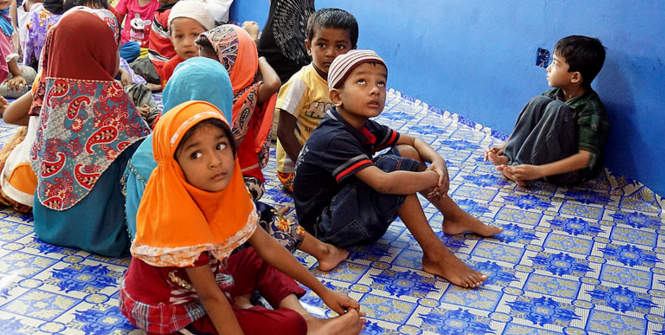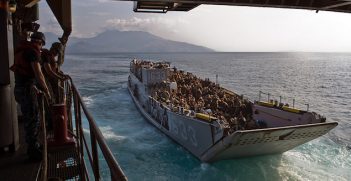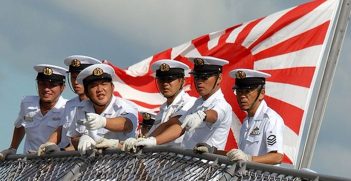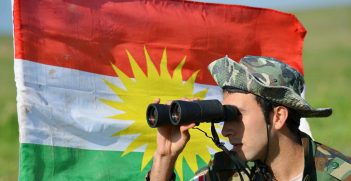The Plight of the Rohingya

The Rohingya are often said to be the world’s most persecuted minority and Asia-Pacific states must engage with the Rohingya crisis in order to improve regional stability and the lives of the Rohingya people.
The vast majority of the approximately one million Rohingya reside in the Rakhine region of Myanmar (formerly Burma), an area bordering Bangladesh. This Muslim minority traces its roots back to Arabic merchants of the late 7th Century, who traded with and then settled in Burma. For centuries, the Rohingya had peacefully inhabited the Rakhine area with Buddhists (majority religion in Myanmar) and under British rule there were plans to create an autonomous zone for the Rohingya people. However, following the withdrawal of British control the country was overtaken by military rule in 1962. Since then, the Rohingya have had their identity and rights gradually and forcefully removed.
The military junta have instituted discrimination against the Rohingya for decades, denying them citizenship and basic services. The 1982 Citizenship Law officially stripped Rohingyan’s of their nationality and made them stateless, on the unsubstantiated and repugnant claim that they are illegal immigrants from Bangladesh. Due to this, the Rohingya lack access to secondary and tertiary education in state-run schools, cannot be issued identification cards to access government benefits and face restrictions on freedoms of religion, association and movement. Rohingya couples have to seek permission from the authorities to marry, usually requiring large bribes, are exclusively limited to having only two children and are not allowed to travel between towns without permission or paying hefty bribes.
Violently compounding this widespread discrimination, the Rohingya have had to face several state-sanctioned ethnic cleansing campaigns. “Operation Dragon King” in 1978 drove 200,000 people to Bangladesh and a similar operation in 1991 forced 250,000 people to flee Myanmar.
The situation over the last three years has been similarly characterised by violence persecution. Tension between the Buddhist majority and Muslim minorities has been boiling over and came to a head in 2002 when Muslim youths raped a young Buddhist woman. Riots, murder, looting, sexual assaults and indiscriminate violence followed. Hundreds of armed Buddhist nationals descended on Rohingyan villages and razed them to the ground, with reports of over 4,500 destroyed structures and a considerable number of deaths.
Security forces have often been complicit in crimes against the Rohingya; standing by and watching the violence, or conducting targeted killings, rape, and mass arrest of the Rohingyas exclusively. The violence has displaced 140,000 Rohingya, who have been forced into low-lying camps in paddy fields that face heavy flooding. These camps are unforgiving places, with thousands sharing four latrines and no nurses or doctors visiting the camps.
The work of international aid organisations has also been disrupted by the Myanmar government and violent nationalists. In 2012, the Myanmar Border Affairs Ministry shut down medical assistance and food programs, and refused to issue travel permits to humanitarian agencies. Following a raft of violence against the Rohingya last year, Medecins Sans Frontieres was suspended from the country after providing medical care to victims, as the government vehemently denied the violence had happened.
Compounding their current situation, most Rohingya face severe food insecurity with an “emergency” level of acute malnutrition. As a direct consequence, the number of Rohingya fleeing Myanmar has risen drastically after 2013, with over 100,000 escaping for their lives by boat. Rohingya asylum seekers look to make it to Malaysia, Thailand, Bangladesh, Indonesia, Australia, or other local Asian-Pacific countries, despite the well-known risks. Thousands have drowned on this perilous voyage, many have been abandoned on the high seas by people smugglers, whilst an unknown number have been abused and killed in smugglers’ camps. Despite this calamitous and alarming humanitarian crisis, the response of the region has been extremely concerning, illegal and at times absolutely repugnant.
The Rohingya have no constituency in the Western world and come from what is regarded as a “strategic backwater” and have received minimal empathy to their protracted plight from the international community. Indeed, for decades Thailand, Bangladesh and Malaysia have pushed Rohingyan boats back into the open sea, in direct breach of the customary, non-refoulement principle of international law. Even if the Rohingya manage to make it to these countries, they are often ineligible for UN aid and protection, are detained and abused and are inadvertently pushed into the human trafficking trade, where they are maltreated and often end up in mass graves.
Thailand, Malaysia, Bangladesh and Indonesia are not signatories to the UN Refugee Convention and are reluctant to adhere to its principles. At the height of the Rohingyan boat crisis in 2015, where hundreds of people were stranded in dingy vessels in the open seas, Australia’s then Prime Minister Tony Abbott responded to suggestions his country should provide asylum for the Rohingya with ‘nope, nope, nope’. The Asia-Pacific’s response to this immediate crisis was absolutely appalling and even after convening a special meeting on this issue, the only solution was that Indonesia and Malaysia took the Rohingyan ashore, with the guarantee they’ll be resettled in third countries.
With little to no action to address the plight of the Rohingya, the Asia-Pacific region is bound to witness this same crisis again. However, it is within the power of this collective of countries to enact a positive change for the stateless Rohingya, and build a positive model of regional cooperation to solve one of the world’s most alarming humanitarian crises.
The situation must firstly be addressed in Myanmar, where human rights abuses against the Rohingya are at their most alarming. It has been alleged that the atrocities against the Rohingya amount to crimes against humanity and that there is a real risk of genocide, if it is not already ongoing. Significant political pressure must be put on Myanmar to end their contemptuous policies against the Rohingya. ASEAN must reverse their policy of non-interference and engage in a dialogue with Myanmar, as the crisis is affecting other countries in the region. Being passive is no longer an option on this issue.
Elliot Dolan-Evans was previously an intern at the Australian Institute of International Affairs Queensland. He is a MBBS and LLB candidate at Griffith University and QUT respectively. This article originally appeared in Transnational Review, published by the Australian Institute of International Affairs Queensland.





